NSB305: Strategies for Conflict Resolution in Nursing Delegation
VerifiedAdded on 2023/06/04
|5
|1447
|352
Report
AI Summary
This report addresses the critical issue of conflict management in nursing practice, focusing specifically on delegation challenges. It highlights the importance of effective delegation for team cohesion and proactive care delivery. The report identifies common barriers to safe delegation, such as interpersonal relationships, personal choices, communication gaps, and inadequate professional development. It discusses the potential negative consequences of unresolved delegation issues, including increased nosocomial infections and decreased team performance. To promote team cohesion and conflict resolution, the report proposes strategies such as clearly defining duties to delegate, providing a follow-up channel for delegates, and implementing a system to appreciate success and motivate delegates. The conclusion emphasizes the need for nurse leaders to be flexible and visionary, embracing qualities that promote effective delegation and mitigate potential conflicts. Desklib provides similar solved assignments and past papers for students.
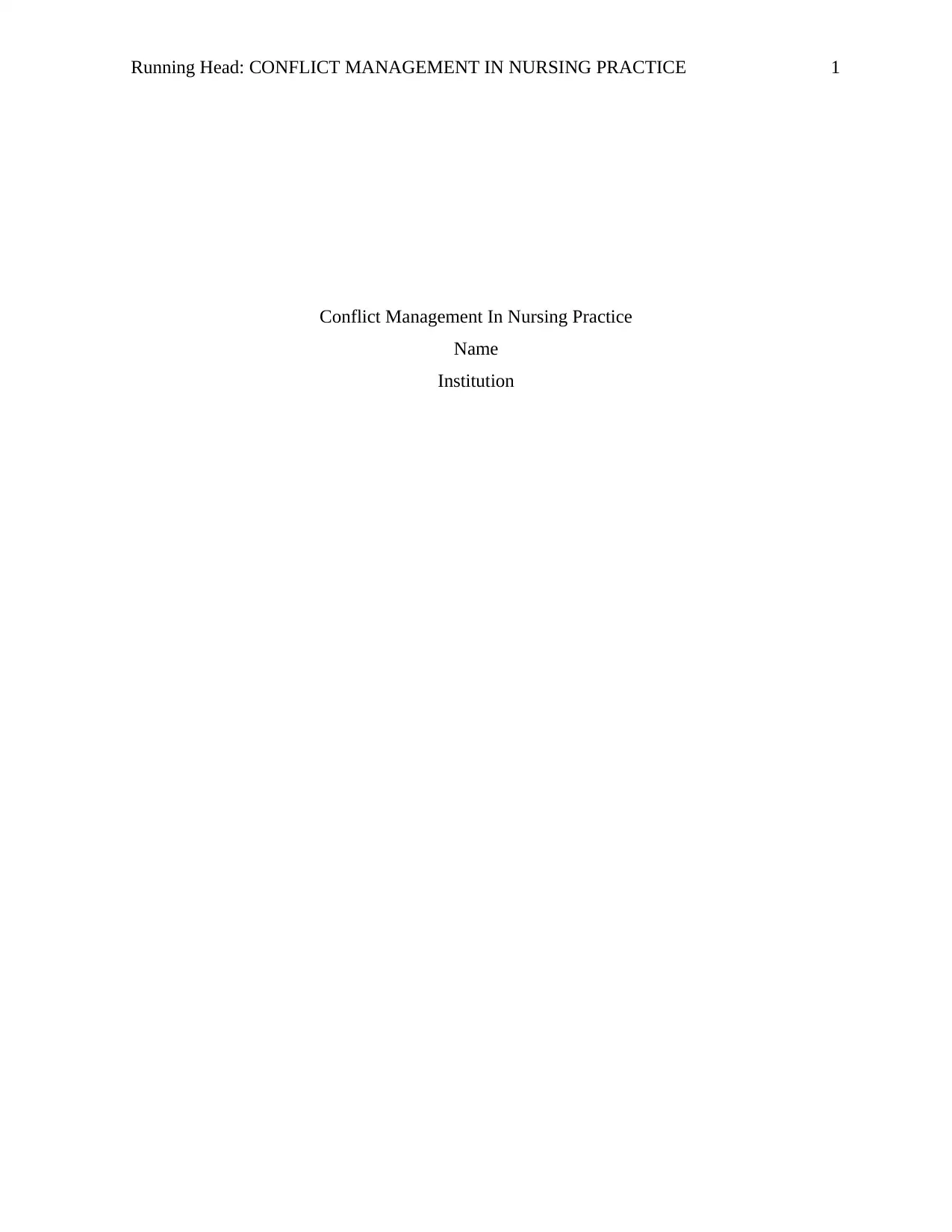
Running Head: CONFLICT MANAGEMENT IN NURSING PRACTICE 1
Conflict Management In Nursing Practice
Name
Institution
Conflict Management In Nursing Practice
Name
Institution
Paraphrase This Document
Need a fresh take? Get an instant paraphrase of this document with our AI Paraphraser
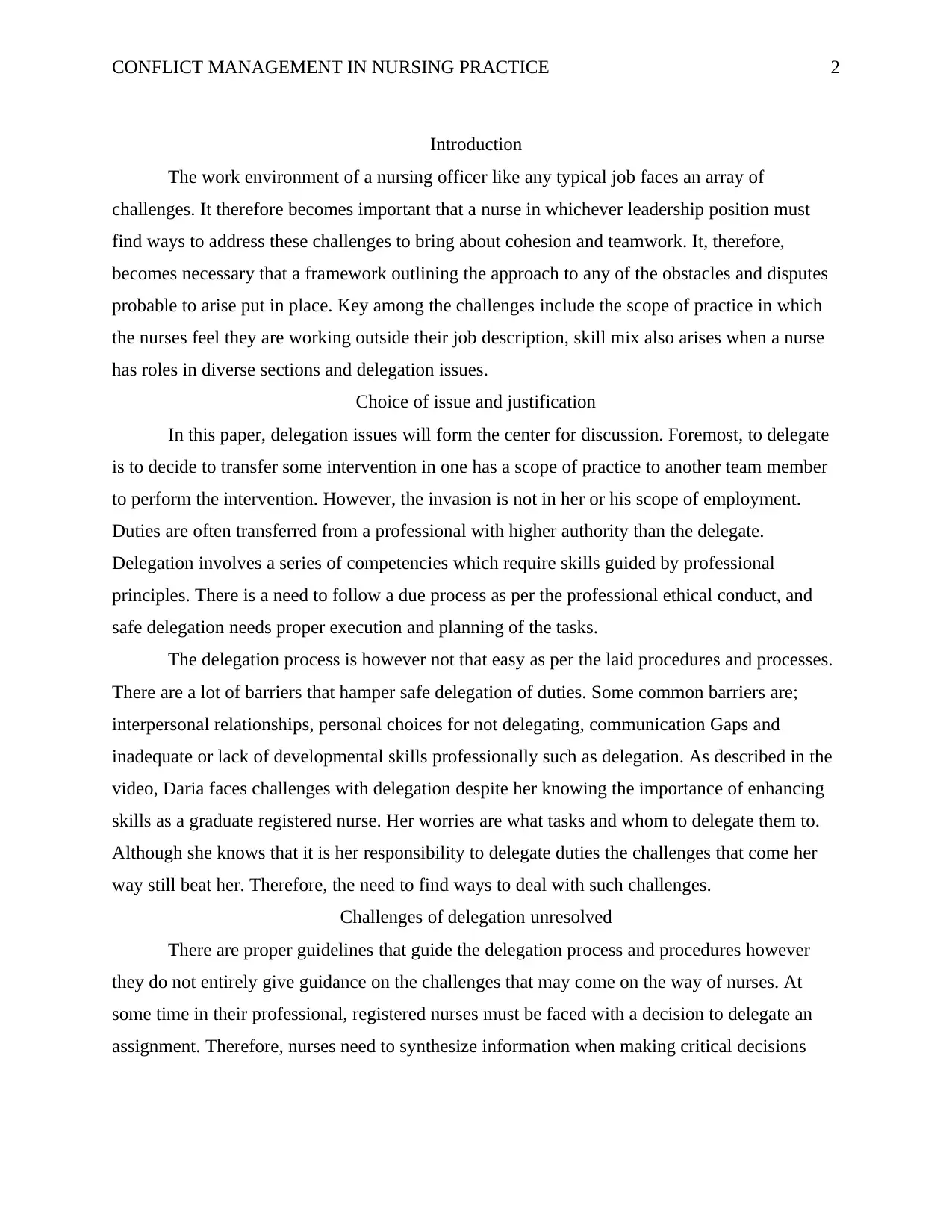
CONFLICT MANAGEMENT IN NURSING PRACTICE 2
Introduction
The work environment of a nursing officer like any typical job faces an array of
challenges. It therefore becomes important that a nurse in whichever leadership position must
find ways to address these challenges to bring about cohesion and teamwork. It, therefore,
becomes necessary that a framework outlining the approach to any of the obstacles and disputes
probable to arise put in place. Key among the challenges include the scope of practice in which
the nurses feel they are working outside their job description, skill mix also arises when a nurse
has roles in diverse sections and delegation issues.
Choice of issue and justification
In this paper, delegation issues will form the center for discussion. Foremost, to delegate
is to decide to transfer some intervention in one has a scope of practice to another team member
to perform the intervention. However, the invasion is not in her or his scope of employment.
Duties are often transferred from a professional with higher authority than the delegate.
Delegation involves a series of competencies which require skills guided by professional
principles. There is a need to follow a due process as per the professional ethical conduct, and
safe delegation needs proper execution and planning of the tasks.
The delegation process is however not that easy as per the laid procedures and processes.
There are a lot of barriers that hamper safe delegation of duties. Some common barriers are;
interpersonal relationships, personal choices for not delegating, communication Gaps and
inadequate or lack of developmental skills professionally such as delegation. As described in the
video, Daria faces challenges with delegation despite her knowing the importance of enhancing
skills as a graduate registered nurse. Her worries are what tasks and whom to delegate them to.
Although she knows that it is her responsibility to delegate duties the challenges that come her
way still beat her. Therefore, the need to find ways to deal with such challenges.
Challenges of delegation unresolved
There are proper guidelines that guide the delegation process and procedures however
they do not entirely give guidance on the challenges that may come on the way of nurses. At
some time in their professional, registered nurses must be faced with a decision to delegate an
assignment. Therefore, nurses need to synthesize information when making critical decisions
Introduction
The work environment of a nursing officer like any typical job faces an array of
challenges. It therefore becomes important that a nurse in whichever leadership position must
find ways to address these challenges to bring about cohesion and teamwork. It, therefore,
becomes necessary that a framework outlining the approach to any of the obstacles and disputes
probable to arise put in place. Key among the challenges include the scope of practice in which
the nurses feel they are working outside their job description, skill mix also arises when a nurse
has roles in diverse sections and delegation issues.
Choice of issue and justification
In this paper, delegation issues will form the center for discussion. Foremost, to delegate
is to decide to transfer some intervention in one has a scope of practice to another team member
to perform the intervention. However, the invasion is not in her or his scope of employment.
Duties are often transferred from a professional with higher authority than the delegate.
Delegation involves a series of competencies which require skills guided by professional
principles. There is a need to follow a due process as per the professional ethical conduct, and
safe delegation needs proper execution and planning of the tasks.
The delegation process is however not that easy as per the laid procedures and processes.
There are a lot of barriers that hamper safe delegation of duties. Some common barriers are;
interpersonal relationships, personal choices for not delegating, communication Gaps and
inadequate or lack of developmental skills professionally such as delegation. As described in the
video, Daria faces challenges with delegation despite her knowing the importance of enhancing
skills as a graduate registered nurse. Her worries are what tasks and whom to delegate them to.
Although she knows that it is her responsibility to delegate duties the challenges that come her
way still beat her. Therefore, the need to find ways to deal with such challenges.
Challenges of delegation unresolved
There are proper guidelines that guide the delegation process and procedures however
they do not entirely give guidance on the challenges that may come on the way of nurses. At
some time in their professional, registered nurses must be faced with a decision to delegate an
assignment. Therefore, nurses need to synthesize information when making critical decisions
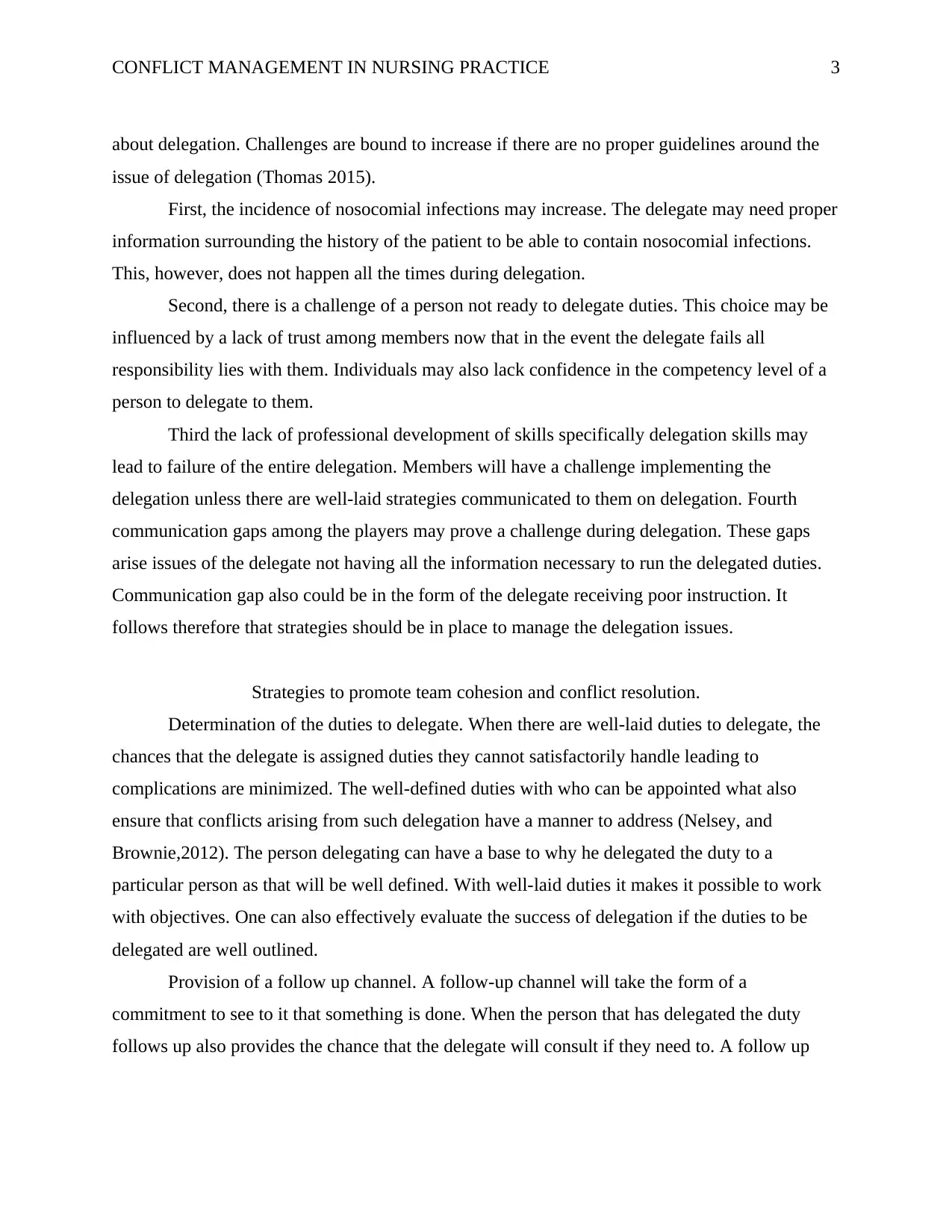
CONFLICT MANAGEMENT IN NURSING PRACTICE 3
about delegation. Challenges are bound to increase if there are no proper guidelines around the
issue of delegation (Thomas 2015).
First, the incidence of nosocomial infections may increase. The delegate may need proper
information surrounding the history of the patient to be able to contain nosocomial infections.
This, however, does not happen all the times during delegation.
Second, there is a challenge of a person not ready to delegate duties. This choice may be
influenced by a lack of trust among members now that in the event the delegate fails all
responsibility lies with them. Individuals may also lack confidence in the competency level of a
person to delegate to them.
Third the lack of professional development of skills specifically delegation skills may
lead to failure of the entire delegation. Members will have a challenge implementing the
delegation unless there are well-laid strategies communicated to them on delegation. Fourth
communication gaps among the players may prove a challenge during delegation. These gaps
arise issues of the delegate not having all the information necessary to run the delegated duties.
Communication gap also could be in the form of the delegate receiving poor instruction. It
follows therefore that strategies should be in place to manage the delegation issues.
Strategies to promote team cohesion and conflict resolution.
Determination of the duties to delegate. When there are well-laid duties to delegate, the
chances that the delegate is assigned duties they cannot satisfactorily handle leading to
complications are minimized. The well-defined duties with who can be appointed what also
ensure that conflicts arising from such delegation have a manner to address (Nelsey, and
Brownie,2012). The person delegating can have a base to why he delegated the duty to a
particular person as that will be well defined. With well-laid duties it makes it possible to work
with objectives. One can also effectively evaluate the success of delegation if the duties to be
delegated are well outlined.
Provision of a follow up channel. A follow-up channel will take the form of a
commitment to see to it that something is done. When the person that has delegated the duty
follows up also provides the chance that the delegate will consult if they need to. A follow up
about delegation. Challenges are bound to increase if there are no proper guidelines around the
issue of delegation (Thomas 2015).
First, the incidence of nosocomial infections may increase. The delegate may need proper
information surrounding the history of the patient to be able to contain nosocomial infections.
This, however, does not happen all the times during delegation.
Second, there is a challenge of a person not ready to delegate duties. This choice may be
influenced by a lack of trust among members now that in the event the delegate fails all
responsibility lies with them. Individuals may also lack confidence in the competency level of a
person to delegate to them.
Third the lack of professional development of skills specifically delegation skills may
lead to failure of the entire delegation. Members will have a challenge implementing the
delegation unless there are well-laid strategies communicated to them on delegation. Fourth
communication gaps among the players may prove a challenge during delegation. These gaps
arise issues of the delegate not having all the information necessary to run the delegated duties.
Communication gap also could be in the form of the delegate receiving poor instruction. It
follows therefore that strategies should be in place to manage the delegation issues.
Strategies to promote team cohesion and conflict resolution.
Determination of the duties to delegate. When there are well-laid duties to delegate, the
chances that the delegate is assigned duties they cannot satisfactorily handle leading to
complications are minimized. The well-defined duties with who can be appointed what also
ensure that conflicts arising from such delegation have a manner to address (Nelsey, and
Brownie,2012). The person delegating can have a base to why he delegated the duty to a
particular person as that will be well defined. With well-laid duties it makes it possible to work
with objectives. One can also effectively evaluate the success of delegation if the duties to be
delegated are well outlined.
Provision of a follow up channel. A follow-up channel will take the form of a
commitment to see to it that something is done. When the person that has delegated the duty
follows up also provides the chance that the delegate will consult if they need to. A follow up
⊘ This is a preview!⊘
Do you want full access?
Subscribe today to unlock all pages.

Trusted by 1+ million students worldwide
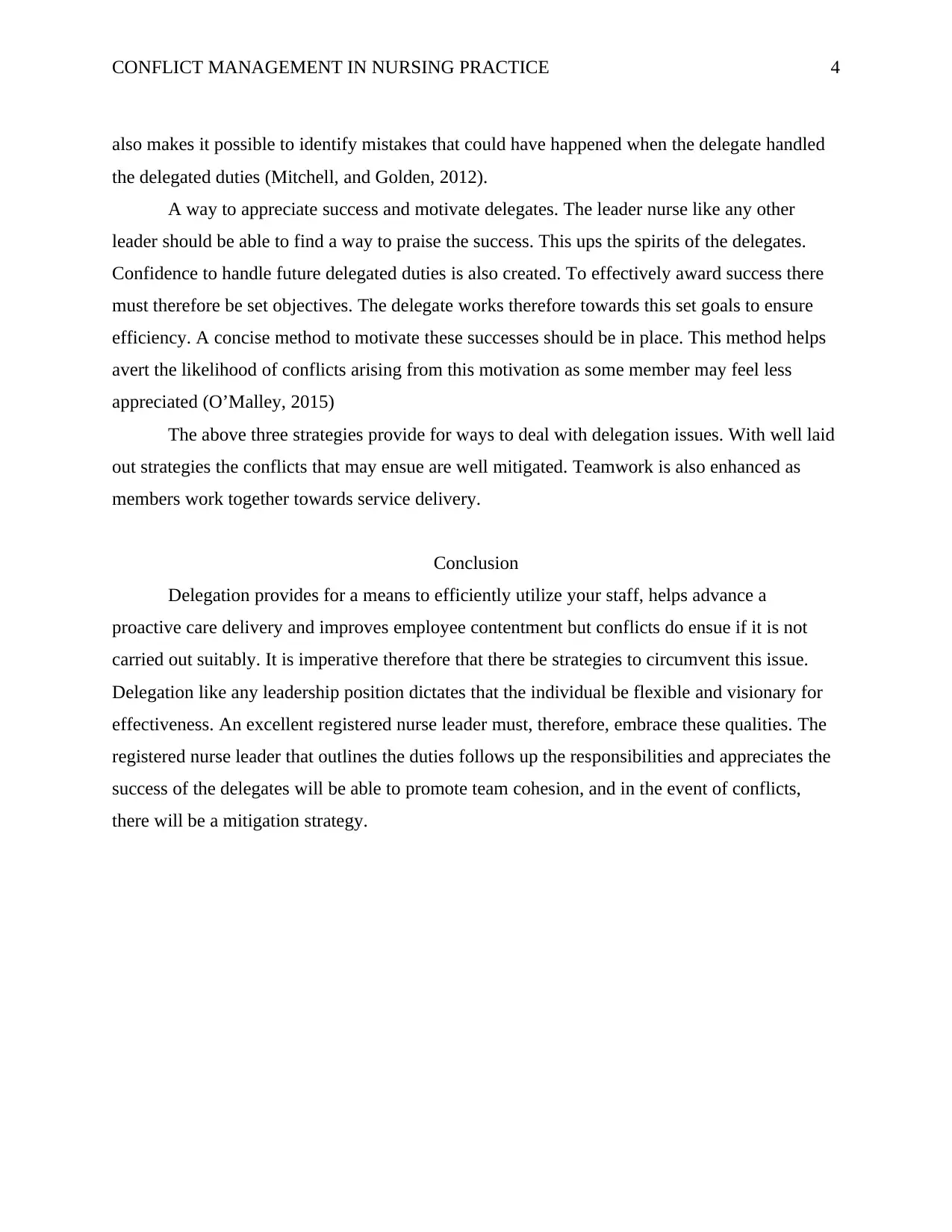
CONFLICT MANAGEMENT IN NURSING PRACTICE 4
also makes it possible to identify mistakes that could have happened when the delegate handled
the delegated duties (Mitchell, and Golden, 2012).
A way to appreciate success and motivate delegates. The leader nurse like any other
leader should be able to find a way to praise the success. This ups the spirits of the delegates.
Confidence to handle future delegated duties is also created. To effectively award success there
must therefore be set objectives. The delegate works therefore towards this set goals to ensure
efficiency. A concise method to motivate these successes should be in place. This method helps
avert the likelihood of conflicts arising from this motivation as some member may feel less
appreciated (O’Malley, 2015)
The above three strategies provide for ways to deal with delegation issues. With well laid
out strategies the conflicts that may ensue are well mitigated. Teamwork is also enhanced as
members work together towards service delivery.
Conclusion
Delegation provides for a means to efficiently utilize your staff, helps advance a
proactive care delivery and improves employee contentment but conflicts do ensue if it is not
carried out suitably. It is imperative therefore that there be strategies to circumvent this issue.
Delegation like any leadership position dictates that the individual be flexible and visionary for
effectiveness. An excellent registered nurse leader must, therefore, embrace these qualities. The
registered nurse leader that outlines the duties follows up the responsibilities and appreciates the
success of the delegates will be able to promote team cohesion, and in the event of conflicts,
there will be a mitigation strategy.
also makes it possible to identify mistakes that could have happened when the delegate handled
the delegated duties (Mitchell, and Golden, 2012).
A way to appreciate success and motivate delegates. The leader nurse like any other
leader should be able to find a way to praise the success. This ups the spirits of the delegates.
Confidence to handle future delegated duties is also created. To effectively award success there
must therefore be set objectives. The delegate works therefore towards this set goals to ensure
efficiency. A concise method to motivate these successes should be in place. This method helps
avert the likelihood of conflicts arising from this motivation as some member may feel less
appreciated (O’Malley, 2015)
The above three strategies provide for ways to deal with delegation issues. With well laid
out strategies the conflicts that may ensue are well mitigated. Teamwork is also enhanced as
members work together towards service delivery.
Conclusion
Delegation provides for a means to efficiently utilize your staff, helps advance a
proactive care delivery and improves employee contentment but conflicts do ensue if it is not
carried out suitably. It is imperative therefore that there be strategies to circumvent this issue.
Delegation like any leadership position dictates that the individual be flexible and visionary for
effectiveness. An excellent registered nurse leader must, therefore, embrace these qualities. The
registered nurse leader that outlines the duties follows up the responsibilities and appreciates the
success of the delegates will be able to promote team cohesion, and in the event of conflicts,
there will be a mitigation strategy.
Paraphrase This Document
Need a fresh take? Get an instant paraphrase of this document with our AI Paraphraser
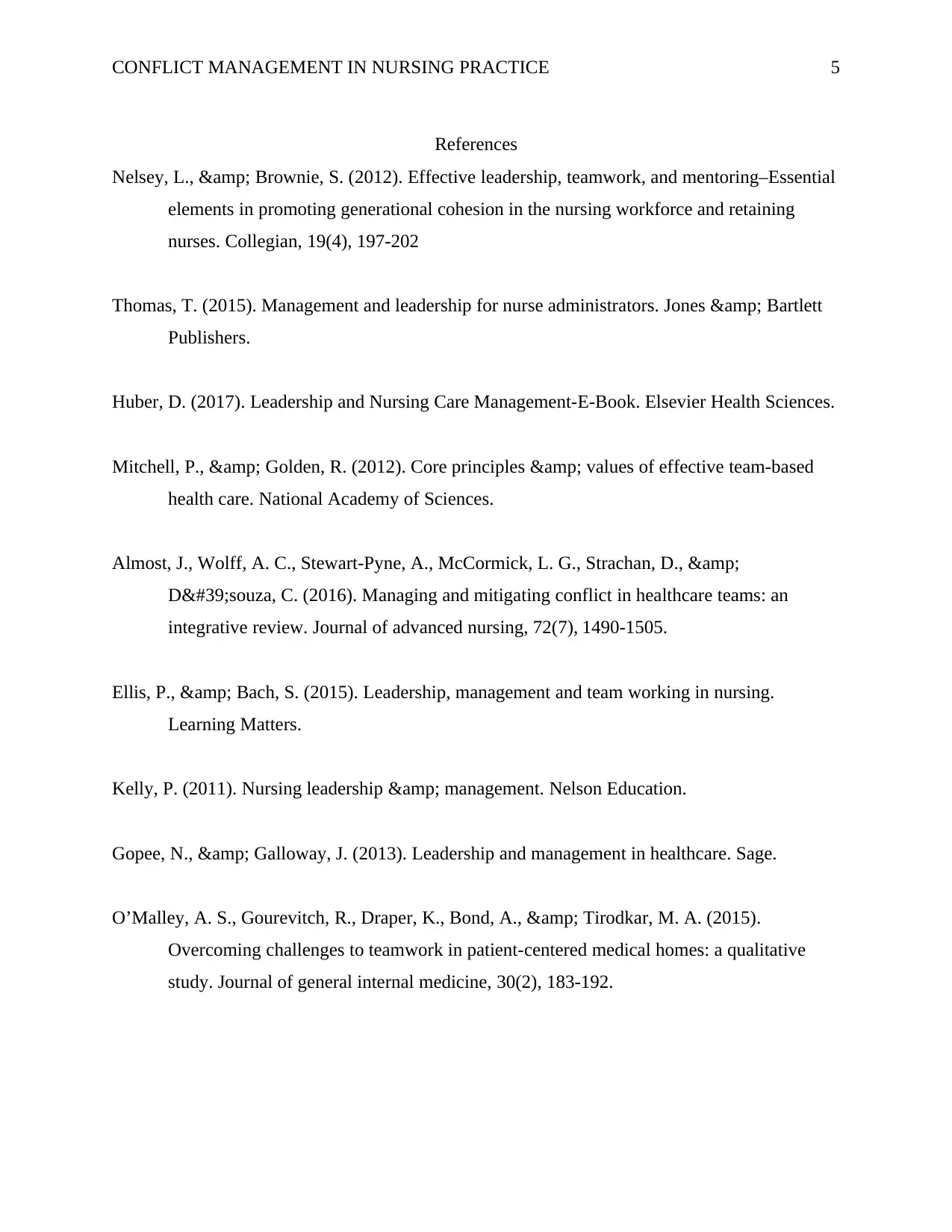
CONFLICT MANAGEMENT IN NURSING PRACTICE 5
References
Nelsey, L., & Brownie, S. (2012). Effective leadership, teamwork, and mentoring–Essential
elements in promoting generational cohesion in the nursing workforce and retaining
nurses. Collegian, 19(4), 197-202
Thomas, T. (2015). Management and leadership for nurse administrators. Jones & Bartlett
Publishers.
Huber, D. (2017). Leadership and Nursing Care Management-E-Book. Elsevier Health Sciences.
Mitchell, P., & Golden, R. (2012). Core principles & values of effective team-based
health care. National Academy of Sciences.
Almost, J., Wolff, A. C., Stewart‐Pyne, A., McCormick, L. G., Strachan, D., &
D'souza, C. (2016). Managing and mitigating conflict in healthcare teams: an
integrative review. Journal of advanced nursing, 72(7), 1490-1505.
Ellis, P., & Bach, S. (2015). Leadership, management and team working in nursing.
Learning Matters.
Kelly, P. (2011). Nursing leadership & management. Nelson Education.
Gopee, N., & Galloway, J. (2013). Leadership and management in healthcare. Sage.
O’Malley, A. S., Gourevitch, R., Draper, K., Bond, A., & Tirodkar, M. A. (2015).
Overcoming challenges to teamwork in patient-centered medical homes: a qualitative
study. Journal of general internal medicine, 30(2), 183-192.
References
Nelsey, L., & Brownie, S. (2012). Effective leadership, teamwork, and mentoring–Essential
elements in promoting generational cohesion in the nursing workforce and retaining
nurses. Collegian, 19(4), 197-202
Thomas, T. (2015). Management and leadership for nurse administrators. Jones & Bartlett
Publishers.
Huber, D. (2017). Leadership and Nursing Care Management-E-Book. Elsevier Health Sciences.
Mitchell, P., & Golden, R. (2012). Core principles & values of effective team-based
health care. National Academy of Sciences.
Almost, J., Wolff, A. C., Stewart‐Pyne, A., McCormick, L. G., Strachan, D., &
D'souza, C. (2016). Managing and mitigating conflict in healthcare teams: an
integrative review. Journal of advanced nursing, 72(7), 1490-1505.
Ellis, P., & Bach, S. (2015). Leadership, management and team working in nursing.
Learning Matters.
Kelly, P. (2011). Nursing leadership & management. Nelson Education.
Gopee, N., & Galloway, J. (2013). Leadership and management in healthcare. Sage.
O’Malley, A. S., Gourevitch, R., Draper, K., Bond, A., & Tirodkar, M. A. (2015).
Overcoming challenges to teamwork in patient-centered medical homes: a qualitative
study. Journal of general internal medicine, 30(2), 183-192.
1 out of 5
Related Documents
Your All-in-One AI-Powered Toolkit for Academic Success.
+13062052269
info@desklib.com
Available 24*7 on WhatsApp / Email
![[object Object]](/_next/static/media/star-bottom.7253800d.svg)
Unlock your academic potential
Copyright © 2020–2026 A2Z Services. All Rights Reserved. Developed and managed by ZUCOL.





